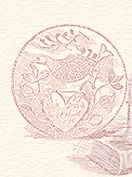Ihr liewe Leit:
Mer sin nau im Yenner, der aerscht Munet im Yaahr. Awwer wisst ihr
liewe Leser ferwas der Yenner der aerscht Munet im Yaahr iss? Nee? Dann lest
mol was der Kallennermann, der Henry A. Schuler (1850-1908) in seim Schtick
fer der Yenner 1905 gschriwwe hot:
"Der Yenner iss der aerscht Monet weil’s Yaahr mit aafangt. Sell
iss nau so in alle christliche Lenner, awwer’s waar net allfatt so. Vor ebbes
meh ass 250 Yaahr hen viel Leit middem Maerz ausgschtaert, wie die alde Romans
als hen vor paar dausent Yaahr zerrick.
“Deel Velker hen’s Yaahr in Friehyaahr aagfange, wann Daag un Nacht
gleich sin; un deel am kazschde Daag. ‘S macht am End net viel aus, wann mer’s
Yaahr aafangt un gebt acht dass mer’s net zu kaz odder lang grickt!
“’S Neiyaahrsschiesse iss en alder Gebrauch wu noch viel uffghalde
watt du rum (1905). Vor alders hot sich en Paerdi uffgemacht, hen die flinde
gelaade un sin vun Haus zu Haus gange fer die Leit Wunsch auswennich gsaat, un
wann er faddich waar, hen sie’s gnalle losse. Noh hen die Leit die
Neiyaahrsschitz ins Haus kumme losse un hen sie getriedt mit Ebbel, Kuche, Wei
un so Dings.
“Sell Neiyaahrsaawinsche waar schee, awwer’s gans aus Faeschen. In
der Schtade kummt nau oft die Baend rum in der Neiyaahrsnacht un schpielt em
en paar Schticker – abbaddich wann sie gaun Geld reese deet fer neie Uniforms
odder ebbes so.
“Mer hen unser alder Schulmeeschder gfroogt ferwas der Munet
‘Yenner’ heesst. Selli alde Romans, secht er, sin schuld draa. Sie hen en
Januarius gheesse noch em Janus, wu ihr Zeitgott waar. Den hen sie abgemolt
mit me dobbelde Gsicht: en frisches, yunges, wu vaersich guckt in die Zukunft,
un en aldes, runsliches, wu hinnersich guckt in die Vergangeheet. Ee Wusch
Haar hot er vane uff em Kopp, ‘s iwwerich iss all blott. Sell guckt
gschpassich, awwer es schteckt en dief Meening drin. ‘S meent dass mer die
Zeit graad vanne am Schopp fascht griege soll un yo net waarde bis sie verbei
iss, fer vun hinne kann mer ken Halt griege.”
Ya,ihr liewe Leser, do kenne mer all ebbes lanne. Awwer ich meen
die reemer hette net draa gedenkt ass fer der alt Professer der Zeitgott gans
blott iss – vane un hinne. Browier wie ich will, ich kann die Zeit eefach net
am Schopp faschtgriege!
Macht’s gut,
Der Alt Professer
|
Dear people:
We are now in January, the first month of the year. But do you dear
readers know why January is the first month of the year? No? Then read
once what the Almanac Man, Henry A. Schuler (1850-1908), wrote in his
piece for January 1905.
“January is the first month because the year begins with it. (Now aren’t
you dear readers glad that you took the time to read this column?) That is
now the case in all Christian countries, but it wasn’t always that way.
For something more than 250 years many people started out with March, as
the old Romans did a few thousand years ago.
“Some peoples began the year in the spring, when day and night are
of equal length; and some on the shortest day. In the final analysis it
doesn’t make much difference when we start the year and take care that we
don’t make it too short or too long!
“Shooting in the New Year is an old custom that is still practiced
quite a bit around here (1905). Years ago, a party was made up, the rifles
were loaded and they went from house to house to shoot in the new year for
people. One of them used to say a long wish by heart, and when he was
finished, they let it crack. Then the people let the New Year shooters
into the house and treated them with apples, cakes, wine, and such things.
“Those New Year wishes were nice, but it is now all out of fashion.
In the city, a band comes around often at New Year’s night and plays a
couple of pieces – especially when they would like to raise money for new
uniforms or something like that.
“We asked our old school master why the month is called ‘January’.
Those old Romans, he says, are to blame for that. They called it Januarius
after Janus, who was their time god. They portrayed him with a double
face: a fresh, young one that looks forward into the future, and an old,
shriveled one that looks backward into the past. He has a lock of hair in
front of his head, the rest of his head is all bald. That looks funny, but
there is a deep meaning therein. It means that we should just grab time by
the tuft of hair and not at all wait till it is past, because you can’t
get hold from the back.”
Yes, dear readers, we can all learn something here. But I thing the
Romans didn’t think of the fact that for the old Professor, the got of
time is entirely bald – in front and in back. Try as I might, I just can’t
grab time by a lock or tuft of hair!
Take care,
The Old Professor |













